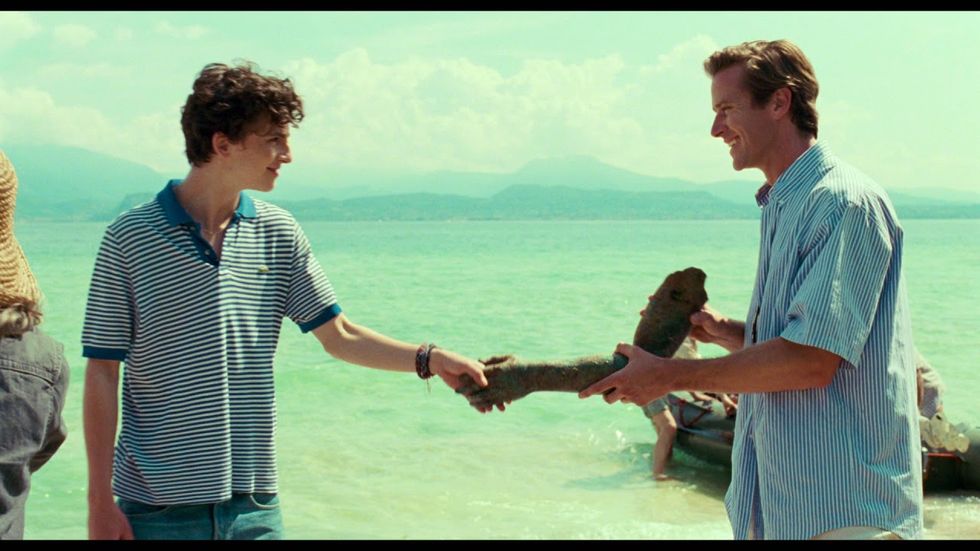Hey, it’s me, late to the game, here to recount to you what you already know and hopefully have already experienced (if you don’t live in a low-budget, collegiate misery like yours truly). With rain in the forecast and the evening off, I had the opportunity to go see a movie, which doesn’t happen nearly as often as I would like. "Black Panther" had debuted the past weekend and people were hauling in by the dozens to see the showings, already sold out for the next 3 time slots.
There was that, and there was "Darkest Hour," which was mostly sold out and gave me the feeling that if I did go to the available showing, my boyfriend and I would become estranged among a herd of East Village movie buffs. And then there was "Call Me By Your Name," which I had heard a lot about but not enough to know what it was actually about and not enough to know the extent of what sort of acclaim it had received. A few of my darling celebrities had given it a shoutout, alongside the likes of "Lady Bird" and the lesser blockbuster films of the year. So I convinced my boyfriend to ditch the Paul Thomas Anderson film and see "Call Me By Your Name" — and thank god I did.
It’s not very often that a movie is capable of enclosing you within its little space. War movies feel vast and sometimes dated; I am physically incapable of understanding what the soldiers in "Dunkirk" were feeling, regardless of the cinematography. Action movies, historical dramas, and so often romances, regardless of how well they're done, generally give you the feeling that you’re watching something happen to someone, yourself not included. This can usually be blamed on subpar dialogue in the case of a bad movie, or in the case of a good movie, it simply becomes a matter of “Will I ever know what it’s like to live under the sparkling circumstances of Annie Hall; will my tongue ever speak in such fine words?”
With "Call Me By Your Name" set in Northern Italy, sometime in the eighties, involving the love interest of two young men, I imagined the relatability levels would be low, and the emotional investment would be of a strictly cinematic sort. I would cry, no doubt. But would I suffer with the characters?
Answer: I absolutely did.
There’s an undeniable nostalgia factor woven throughout the screenplay and played on within the direction. Not for the eighties, or for a time in your family’s 17th-century Italian estate, but for youth. The warmth of summer, the spontaneous bike rides and, most importantly, the feeling of falling in love for the first time. This isn’t a feeling which is mushy-gushy, but a feeling that is equal parts painful and frustrating and absolutely beautiful. I think where a lot of movies miss the target is that they desire to make love something that is desirable, which it is, to a certain extent, but a first love is not something that I think anyone, especially after being reminded by the fumbling actions and wild frustrations of Elio, would ever want to relive.
The scenery is dream-like and the soundtrack matches, but what is truly brilliant is the way in which the movie evokes a feeling that we probably forgot we ever felt— even if the setting and situation are completely incompatible with the memories we have. Human desire is far more complex and intractable than we like to think, and can’t be bound to the case scenario. I don’t think I cried for Elio or Oliver, or cringed because I was experiencing second-hand embarrassment, but because I felt with them. The film left me jarred, emotionally, and completely flushed out with feeling. It was such a cathartic and organic experience that I am considering seeing it again to see what kind of feelings it will extract from my id in round two.
Don’t see this movie because you think Timothée Chalamet is cute or Armie Hammer is eye candy— though both those statements become all the more undeniable after you see the film. Don’t see this movie because Sufjan Stevens did the soundtrack and you heard it was good (again, completely and utterly true). See this movie because the way it will make you feel is painful and raw and lovely and tragic, all at once and all without even realizing you’re feeling it. Anything set in Northern Italy has the potential to be stunning, and the background functioned without fail, but see this movie because the way the characters develop is more beautiful and more compelling than any 17th-century Italian lakeside estate or any beautiful movie score. Not only can you see it and appreciate it, but you can feel it and live it.















